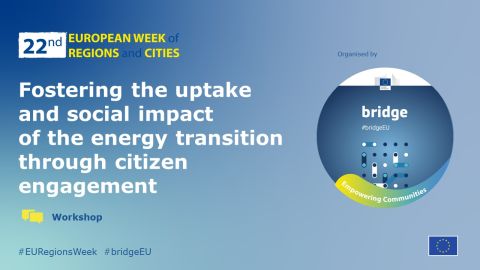
Despite growing recognition of citizen engagement in the energy transition, significant barriers hinder community involvement. These include lack of awareness, socio-economic disparities and insufficient participation mechanisms. Overcoming these obstacles is essential for an equitable transition and promoting a greater uptake to enact lasting change. This panel provides insights and strategies for policymakers to foster citizen engagement and achieve a sustainable energy future.
- Local and regional | Energy | Sustainable | Social inclusion and Equality | Youth and citizens engagement
- Code: 10WS24965
- Albert Borschette Conference Centre, AB-2A
Speakers
Practical information
- When
-
Thu 10/10/2024, 09:30 - 10:30 CET
- Where
- Albert Borschette Conference Centre, AB-2A
- Type of partnership
- Partnership
- Format
- Workshop/ panel debate
- Theme
-
Regions strengthening European Democracy
- Language
- English
- Website
-
https://bridge-smart-grid-storage-systems-digital-projects.ec.europa.eu/

Partner

BRIDGE
Document
Reporting
Session summary
The workshop focused on the critical role of citizen engagement in ensuring that the benefits of the energy transition are not only widely understood but also equitably distributed, leading to more sustainable and inclusive outcomes. Engaging citizens from diverse backgrounds in the decision-making and implementation processes is essential for fostering trust, increasing public awareness, and addressing potential concerns or barriers to new technologies and policies. By incorporating the views, needs, and values of local communities, the energy transition can achieve broader social acceptance, minimize resistance, and empower individuals to take an active role in shaping their energy future.
Below are the major points of discussion:
- User Acceptance as a Central Barrier: The conversation emphasized the need for technological solutions to account for user preferences, fears, and needs. A recurring theme was the mismatch between what engineers and scientists develop and what citizens are willing to adopt. Several examples were discussed where technological solutions failed to align with citizens' needs, highlighting that technological advancement alone is not enough — engagement, trust, and a clear understanding of user concerns are essential for fostering adoption and the uptake.
- Role of Cities in Citizen Engagement and Tailoring Strategies: Cities like Athens, which have taken a proactive role through initiatives like the Athens Climate Forum and Climate Youth Assembly, demonstrated the benefits of involving citizens at local levels. Athens' approach, which includes energy poverty management, energy communities, and educational programs, shows how cities can tailor policies and engagement strategies to local needs while aligning with broader European goals like climate neutrality. These programs have targeted vulnerable households, young people, and local businesses, demonstrating that tailored engagement can lead to meaningful policy outcomes.
- Early Engagement: Early engagement has emerged as a best practice in involving citizens, ensuring that outcomes align with their values from the earliest stages of project development. Effective engagement requires time, organization, and a sustained effort—it is not a one-off event but rather a continuous process involving different stakeholders. This approach includes addressing regulatory barriers by engaging with relevant authorities and ensuring the needs of vulnerable groups are part of the conversation. The example of Athens’ Ascent project in the superblock initiative highlights how co-designing energy and urban solutions with citizens, while taking into account their cultural and social contexts, alongside collaboration with authorities to address specific street conditions, can lead to more successful outcomes.
- Barriers to Engagement: Beyond technological challenges, the workshop identified various social and behavioural barriers to citizen participation in energy projects. These included limited awareness of energy issues, lack of trust in authorities, and engagement overload (i.e., the same citizens repeatedly being asked to participate). Addressing these requires simplifying communication, using trusted local actors, and demonstrating tangible benefits to citizens, such as cost savings or environmental impacts.
- Multidisciplinary Approach: A common thread in the discussions was the need for multidisciplinary collaboration. Energy transition projects are not just about engineering solutions but also about integrating social sciences, policy, communication, and community engagement. Cities can act as key coordinators for this cross-sectoral collaboration. Participants emphasized the importance of breaking the silos between different aspects of sustainability (e.g., energy, mobility, biodiversity) to create holistic, long-term plans for urban areas.
- Technology and Simplification: When introducing complex technologies like digital twins or energy data management systems, simplicity and clarity are essential for communicating benefits to citizens. Engaging them requires breaking down technical concepts into accessible language and showing direct advantages, such as cost reductions or community benefits, to increase trust and participation.
- Need for Best Practices and Case Studies: Participants stressed the value of sharing best practices and lessons learned from initiatives across Europe. Practical examples from Athens and other cities were highlighted as essential to inspire and guide other municipalities in engaging their citizens effectively.
In conclusion, the workshop underscored that citizen engagement is essential for the success of the energy transition, requiring the incorporation of user perspectives, early involvement in co-design, and breaking down barriers to participation through effective communication and trust-building. Holistic and cross-sectoral approaches, supported by local governments and multidisciplinary collaboration, can create impactful and sustainable change.



